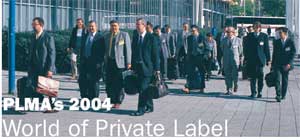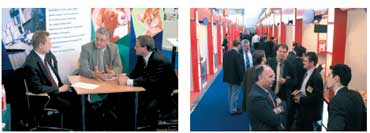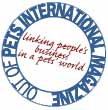
PETS International (PI) interviewed Brian Sharoff, President, PLMA about the main developments in the international private label industry. This interview is mainly focussed on the role of the retailer and to have his own private label and A-labels on the shelve. What does that mean for the retailer when he starts or have already own Private Label or expands the private label product range? But also what can or must be the role of the Private Label and A-Label manufacturer.
PI: In the pet industry there are coming more and more retail chains which have introduced or will introduce
private label products in a short period of time. What are according to you the most vital points the retailer has
to keep in mind by building an appropriate private labelprogram?
Retailers who decide to adopt a private label strategy must keep quality in mind at all times. Private label programmes are only profi table and successful when they offer the consumer good quality, attractive packaging, and, when needed, product innovation. Selling private label as a cheap alternative to an A-brand risks the loyalty of the consumer as well as the reputation of the retailer.
PI: What can or must be the role of the private label manufacturer to assist the retailer to build the right product range?
The manufacturer has a unique role to play as the private label supplier to the retailer. Although the product does not carry the manufacturer's brand on it, the product will carry the brand of the manufacturer's customer on it – the retailer. The fi rst rule of sales is to keep the customer happy and keeping the retailer happy is vital to a private label manufacturer. Usually, this role means making the best possible product for the retailer, giving the retailer the advantage of the manufacturer's R&D, helping the retailer to understand the category, suggesting merchandising and marketing ideas to improve sales. Obviously, the manufacturer benefi ts from the proper implementation of these recommendations in terms of keeping a customer as well as boosting sales. Remember that while the retailer may understand his business better than the manufacturer, the manufacturer has experience with numerous retailers and wholesalers and therefore can add perspective.
PI: Starting with a private label program as a retailer, does this mean that you have to reconsider the perceived value of the shop(s). What has the retailer to keep in mind to run this process smoothly?
The retailer's private label programme should be seen as an extension of the concept of the shop(s) the retailer operates. That means that in-store graphics support the private label products on the shelf just as the products support the image of the shop in general. What the retailer needs to keep in mind is that each part of the shopping experience reinforces the other. This includes the attitudes of shop personnel and media advertising. Those retailers who integrate everything into one image are said to "brand" themselves and their shops. That is the objective. The pay-off, of course, is extraordinary customer loyalty.
PI: What are the main differences in the communication strategy between the supermarket/ hypermarket versus the specialised shops if they are introducing private label?
Obviously there are differences in strategy between a supermarket / hypermarket which carries thousands of product categories and a specialised shop which is focusingon a smaller selection of categories. In terms of the introduction of private label, however, the distinction is less clear-cut. Both have the same task: to communicate confi dence to the consumer. This usually involves communicating quality but it can also apply to communicating assortment. I think the most important goal for the specialised shop is to communicate that it is involved in the private label product. The consumer has already made a choice that he or she prefers the specialized shop. Now the task is to communicate that the private label programme represents the involvement of real people who understand the category, not far away companies who send products to be assigned to shelves.
PI: Assume that the pet retailers are really able to build over the years a complete Private label program, so containing low price, super and premium products, do they then need still (A)-labels?
Generally, retailers want to offer both A-brands and private label. This is done in order to give consumers a choice as well as a way to highlight the advantages of the private label by allowing consumers a chance to make comparisons. How many A-brands are needed in a category is really a question of shelf sales performance and supply chain management. Many retailers have determined that one or two A-brands are all that are necessary and that more A-brands simply don't justify their shelf space in terms of sales. The key is really the consumer and what will continue to bring the shopper into the shop.
PI: It seems that in the near future the powerful position is of the retailer chains instead of the manufacturers. Do you agree?
The balance of power has already shifted from the manufacturer
to the retailer. In the days when retailers were small and independent, the A-brands could attract consumers and develop traffi c for retailers that they couldn't do themselves. In today's world, the retailers are often bigger than the manufacturers, build their own consumer traffi c and do not need the A-brands as they once did. I think that this will be the balance of power for decades to come.
PI: And what about the wholesalers in this ballgame? Is there still a future for them?
Wholesalers have a great opportunity is this age of private label. They can develop their own lines with their own brands and market it through smaller retailers who cannot afford to create their own private label programmes. Many wholesalers are doing this currently. There are important differences between a wholesalerowned private label and a retailer-owned brand, not the least of which is the absence of the retailer's name on the product. This impacts on advertising and promotion, but is not insurmountable. It takes more aggressive merchandising inside the store and an educated retailer who understands how to promote a wholesale brand.
Trade Show to be held 25-26 May PLMA's 2004 "World of Private Label" International Trade Show, to be held 25-26 May at the RAI Centre in Amsterdam will be bigger than last year's event.

The Trade Show will have more than 2,700 exhibit stands from companies in over 60 countries, according to Brian Sharoff, President, PLMA.
"Private label's growth is coming from a broad range of products and categories, and this will be seen this year on the Trade Show fl oor," Sharoff said. "There is a good balance of food products—such as grocery, fresh and frozen—as well as nonfood items, such as health and beauty, household and kitchen, and personal and leisure products."
More national and regional pavilions will be exhibiting this year, refl ecting the growing importance of international sourcing in private label. There will be new pavilion organisers from France, Greece, Poland, and Turkey. There will be more than 30 pavilions, displaying products and packaging from Europe, Asia, The Middle East, and The Americas.
The latest research on what retailers are planning for their private label programmes will be a highlight of the seminar presentations that begin on Monday afternoon, 24 May.
The 2004 Retail Trends Survey, prepared exclusively by PLMA, presents the responses from executives across Europe on retailing and private label topics.
Show venue:
RAI Exhibition Centre in Amsterdam
Show Dates:
Tuesday 25 and Wednesday 26 May 2004
Show Opening hours:
from 09.00 to 18.30 hrs (Wednesday until 16.30 hrs)
Number of exhibition
stands: ca. 2700
Exhibitor Profile:
Manufacturers from more then 60 countries from
the different continents
Show floor:
25.000 net square meters of which ca. 5% is occupied by the pet industry: pet food and/or pet accessories & supplies manufacturers.
Pavilions:
30 national
pavilions (New pavilions from France, Poland, Greece, Turkey, Malta and Indonesia).
PLMA's 2004 'World of Private Label'
Among the subjects covered will be what retailers are thinking about new products, quality, advertising, marketing and retailer-manufacturer relationships.
"World of Private Label" International Trade Show will attract thousands of buyers, representing the world's supermarkets, hypermarkets, discounters, department stores, wholesalers, importers and exporters. Retailers such as Aldi, Metro, Carrefour, Tesco, ASDA, Wal-Mart, Marks & Spencer, Ahold and Leclerc attend the event.

Seminars:
Time:
Monday 24 May from 14.00 to 16.00 hrs.
Location:
Forum Centre at the RAI Exhibition Centre
Seminar 1:
PLMA's 2004 Retail Trends Survey: "The Future of Retailer Brands and Relations with Manufacturers"Speakers: Jeff Freeman, Manager, Research Services, PLMA and Rien Wesseling, Wesseling Company Strategics ; 1400 – 14.30 hrs
Seminar 2:
Business Report "Where are Retailers Really Going" Speaker: Bryan Roberts, Global Retail Research Manager, M +M Planet Retail, 14.30 –15.15 hrs.
Seminar 3:
Marketing Report: "Success Stories with Private Label: Carrefour and Costco", Moderator, Tim Simmons,
Vice President, Communications PLMA. 15.15 – 16.00 hrs
For further information:
Email: info@plma.nl
www.plmainternational.com
Source: PETS International Magazine
HOME - About PetsGlobal.com - Pet Industry Links - Update my company - Contact PetsGlobal.com
© 2001-2025 PetsGlobal.com All right reserved